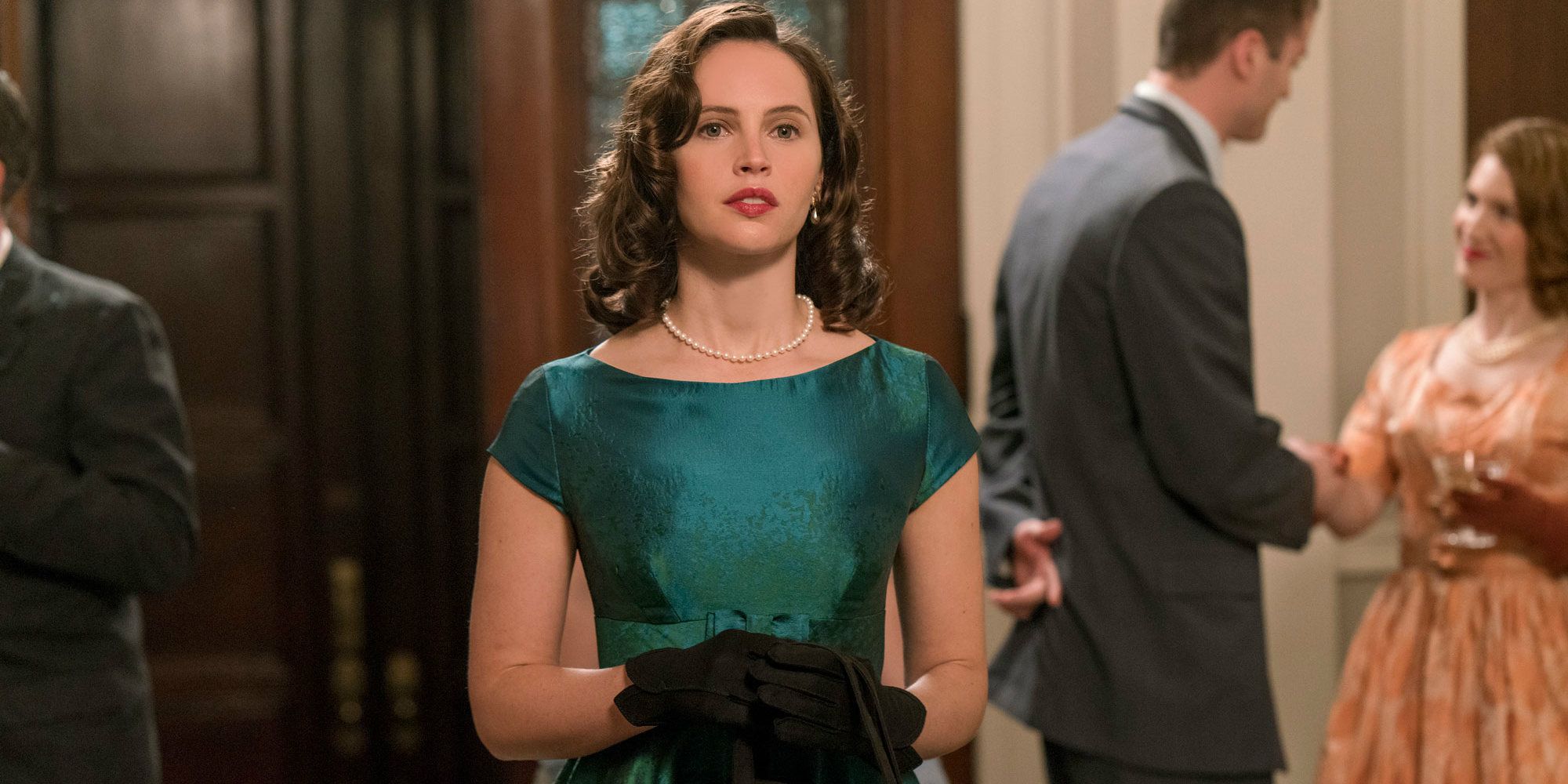Although she sadly passed away in September 2020, Justice Ruth Bader Ginsburg will forever be remembered as a true American hero and a champion of women’s rights and the law. She was regarded as a skilled litigator, but it was during her time serving on the Supreme Court that she gained popularity among the public.
Her 2018 biopic, On the Basis of Sex, allowed audiences a glimpse of her early career, education, and personal life. The film follows her as a student, a law professor, and eventually a litigator, all while raising a family and overcoming the challenges presented by a world that does not always wish to see women succeed.
She Attended Harvard And Columbia

Over the course of her education, Ginsburg (played by Felicity Jones in the film) attended not one, not two, but three Ivy League schools. The film does not mention that she did her undergraduate work at Cornell University, but it does follow her studies at Harvard Law School and her transfer to Columbia Law when her husband Martin got a job in New York.xf
During her studies, Ginsburg was also the first woman to contribute to two major law reviews, legal periodicals to which select top students contribute, both in the Harvard and Columbia Law Reviews.
She Was Jewish

In the film, a lawyer interviewed an over-qualified Ginsburg for his firm and described her as a “wife, a mother, and a Jew, to boot,” as an explanation as to why a total of 12 law firms turned down the highly educated law school graduate. The film later makes a reference to Camp Che-Na-Wah, a Jewish summer camp Ginsburg attended as a child.
Before she was laid to rest at Arlington National Cemetery, she lied in state in the U.S. Capitol. Many commentators made the point that in addition to being the first woman to lie in state at the Capitol building, she was also the first Jewish person to have the honor.
“Kiki”

The characters in the film who seem to know her best, her husband and childhood friend, often call her by the nickname “Kiki.” According to Ginsburg’s autobiography, My Own Words, the nickname was given to her by her older sister, who observed that Ruth was a “kicky” baby.
Ginsburg, in fact, had been known by several variations of her name. Born with the first name Joan, she started school and found it a popular name, so her mother, Celia Bader, decided her daughter should go by her middle name: Ruth. Of course, she added her married name when she married Martin Ginsburg, after graduating from Cornell.
She Cared For Her Mother In High School

Earlier versions of the film reportedly delved even deeper into Ginsburg’s past relationship with her mother, who died of cancer when Ruth graduated from high school. Her experience as her mother’s caregiver provided some emotional backdrop when she took on a case of a man who cared for his elderly mother.
The mother-daughter relationship is also mirrored in the interactions between Ruth and her daughter Jane, who was also coming of age during the bulk of the narrative. Notes at the end of the film reveal that Jane followed in her mother’s footsteps and, after graduating from Harvard, became a law professor at Columbia.
Sixth Harvard Law Class To Admit Women

In 1950, Harvard Law School began admitting women. By the time Ginsburg enrolled in classes there in 1956, she was one of only nine women in her class of over 500 students. The film depicts one particular dinner held at Dean Erwin Griswold’s home to which he had invited all the women in the class, and the scene is based in reality. In Ginsburg’s words, he gathered all the women and asked them why they were in law school, “… occupying a seat that could be held by a man.”
Although the film makes him out to be something of an antagonist, Ginsburg also noted that the dean later explained his intention was not to imply they weren’t deserving of their seats but to give them a chance to prove, in their own words, the value of their legal education to some of the faculty who still thought admitting women was unwise.
She And Her Husband Attended Law School Concurrently

Martin Ginsburg (played in the film by Armie Hammer) was only a year ahead of his wife while in law school. In the film, Ruth’s sarcastic response to the dean’s question about why she decided to attend law school was that she wanted to learn more about her husband’s work, so she could “be a more patient and understanding wife.”
When they married, the couple decided that they would choose a profession to pursue together, ultimately settling on law. Unfortunately, while they were both enrolled, Martin fell ill from testicular cancer. Ruth attended his classes, as well as her own, and took notes for the both of them. Soon, both of the Ginsburgs were revered in the legal community, with Martin becoming a well-regarded attorney, specializing in tax law.
She Graduated First In Her Class

Most women, especially those in male-dominated professions, are familiar with the phenomenon of having to work 10 times harder than their male peers in order to gain the same acclaim in their fields. This was true for Ruth Bader Ginsburg throughout both her education and career.
During her interactions with her professors and fellow classmates, it becomes clear that she is dedicated to her studies and that her reasoning is much more advanced compared to her peers. It’s no wonder why she graduated from Columbia at the top of her class and contributed to its law journal.
She Started Practicing Law 14 Years After Graduating

Despite her prestigious academic record and dazzling recommendations from her professors, Ginsburg found that being a woman made it difficult to find a job as a litigator. The film depicts an interview with an attorney at a law firm, where she reveals 12 firms had previously turned her down.
RELATED: All The Blockbuster Films Featuring Female Leads In 2018
It wasn’t until 1972, after she had been a clerk for Judge Edmund Palmieri, a research associate in Sweden, and a professor at Rutgers Law School, that she began her work with the ACLU, or the American Civil Liberties Union, where she co-founded its Women’s Rights Project and began arguing cases before judges.
She Battled Cases of Discrimination One By One

Ginsburg is beheld as a pioneer of women’s rights, and the method she went about this was strategic. Instead of dismantling the system of gender discrimination all at once, she targeted specific areas of the law that discriminated based on gender.
Seeing that a chain reaction, beginning with the court’s decision to deny Myra Bradwell the right to practice law in 1873, led to an entire legal system rife with discrimination on the basis of sex, Ginsburg used each of her wins as a precedent for her future cases until women and men were equal under many areas of the law.
Moritz V Commissioner Of Internal Revenue

The film’s narrative comes to a head at just one of these historic cases, a year after Ginsburg wrote the brief for Reed v Reed, a landmark case that decided it was unlawful to name an administrator of an estate based on sex and to which the film also pays tribute.
In the case of Charles Moritz, who was denied a caregiver tax deduction because he was an unmarried man, Ginsburg used the decision made in Reed v Reed to demonstrate that it was unlawful to extend the tax deduction to women in Moritz’s position but not to men. Section 214 of the tax code was amended to extend the deduction to never-married men, thereby setting a second precedent for Ginsburg and the ACLU to build upon.




